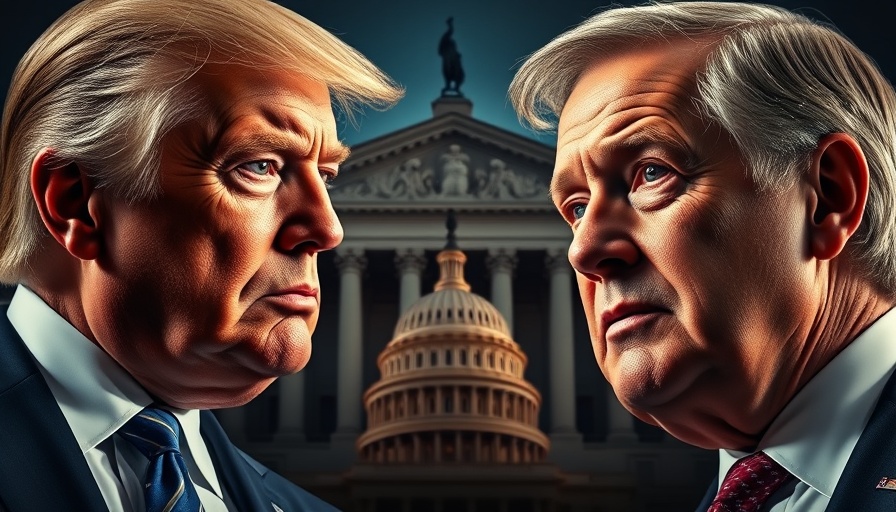
The Trump-Powell Saga: Unpacking a Potential Federal Reserve Overhaul
Recent headlines have reignited speculation about a power struggle between former President Donald Trump and current Federal Reserve Chairman Jerome Powell. The tension reflects deeper concerns about the Federal Reserve’s independence, and how political dynamics might play a significant role in economic policy decisions. As Trump contemplates a potential move to oust Powell, investors and analysts alike are keen to understand the implications of such a drastic action on the economy.
In 'Trump vs. Powell: Secret Plot to Take Over the Fed EXPOSED!', the discussion delves into the complexities of Trump's potential influence over the Federal Reserve, prompting us to analyze its implications for investors and the economy.
Historical Context: The Fed's Fragile Independence
The Federal Reserve, established in 1913, has historically been understood as an apolitical body, one that operates independently of government influences to manage monetary policy effectively. However, this independence has been increasingly questioned, particularly since the financial crises of the 21st century. Following the 2008 financial meltdown, the Fed's policies, including unprecedented bond purchases, blurred the lines between fiscal policies and central banking, leading to growing public skepticism about its autonomy.
For Trump, his chosen narrative of a politically motivated Federal Reserve aligns with a broader history of critiques that the institution serves political ends rather than purely economic objectives. This sentiment was particularly echoed when former New York Fed President Bill Dudley suggested the central bank should consider political ramifications in their decisions, thereby transforming the Fed into a player with vested interests in electoral outcomes.
The Power of the Presidency: Could Trump Remove Powell?
Central to this mounting drama are the legal implications surrounding the Fed's leadership structure. Trump has previously remarked that he believes Powell’s reluctance to lower interest rates could stem from political motivations. The potential for Trump to fire Powell hinges on a pending Supreme Court case that might redefine the justification needed to dismiss government officials without cause. If the Supreme Court favors Trump's appeal, it could significantly empower him with the authority to restructure the Fed, elevating the stakes for markets everywhere.
What would it mean if Trump were to replace Powell? Historical precedence exists for such actions: transitions in Fed leadership have often been marred by political maneuvering, notably the abrupt leadership changes observed during prior administrations. Such an overhaul could usher in an entirely new approach to monetary management, further entrenching the intersection of economics and politics.
The Markets: A Volatile Reaction
At the heart of this speculation lies a critical question: how would markets react to a potential ousting of Powell by Trump? Financial markets thrive on predictability, and the prospect of drastic changes can lead to heightened volatility. The fear of political interference in monetary policy could catalyze a loss of confidence among investors. Market participants are already experiencing jitters due to ongoing tensions around U.S. interest rates and broader economic indicators, leading to predictions of both short-term disruptions and long-term shifts.
As bond markets reflect increasing volatility amidst potential politicking, historical occurrences indicate markets have responded negatively to perceived government overreach. The example of UK Prime Minister Liz Truss showcases how bond market reactions can precipitate swift political consequences, underscoring the interconnectedness of economic and political narratives.
Future Predictions: The Path Ahead for the Federal Reserve
Looking ahead, the implications of any administrative changes within the Fed could be profound. Should Trump proceed with plans to replace Powell, it could lead to a broader shift in how monetary policies are crafted. Analysts and economists agree: a complete loss of Fed independence could spiral into rampant inflation, misaligned resource allocations, and an adverse economic climate for average citizens.
Furthermore, if Trump believes the Fed's current policies are politically motivated, any leadership change might be viewed through a lens of further governmental control over fiscal strategies, potentially resulting in a 'printing money' scenario to cater to spending outputs. This has ramifications not only for economic stability but also for legislative integrity.
Conclusion: The Implications for Investors and Analysts
For those deeply embedded in macroeconomic trends and cryptocurrency landscapes, the ongoing Trump versus Powell saga presents both challenges and opportunities for strategic thinking. Given Dr. Eleanor Stone’s focus on the intersections of financial systems and emerging digital currencies, it becomes increasingly clear that the outcome of this political episode will reverberate far beyond traditional finance.
Investors must remain alert and adaptable, as evolving regulations and market forces could create dichotomies between risk management and capital allocation. As an educated and informed audience, understanding these dynamics is vital for making sound investment decisions moving forward.
For those looking to stay ahead in the fast-evolving world of cryptocurrency and economic policy, I encourage you to explore our diverse range of resources including Coin Bureau insights, which provide essential educational material designed for the sophisticated trader and investor. Equip yourself with knowledge on market analysis videos, cryptocurrency trends, and macroeconomic developments to navigate this complex landscape. Together, let's prepare for the future of finance.
 Add Row
Add Row  Add
Add 




 Add Row
Add Row  Add
Add
Write A Comment